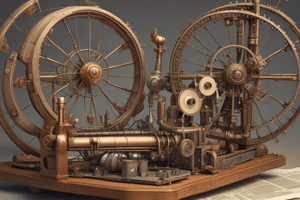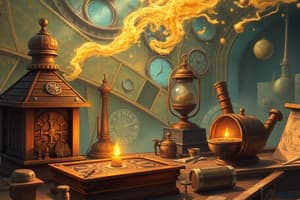Podcast
Questions and Answers
What financial strategy did Carlson utilize to develop his photocopier?
What financial strategy did Carlson utilize to develop his photocopier?
- He partnered with a major corporation.
- He launched a crowdfunding campaign.
- He sought loans from financial institutions.
- He used his own money for initial development. (correct)
What key obstacle did Carlson face in the development of the photocopier?
What key obstacle did Carlson face in the development of the photocopier?
- He lacked support from the scientific community.
- The process was complicated and costly. (correct)
- The design was too simplistic.
- He could not find a suitable location for production.
How did Carlson's wealth impact his lifestyle?
How did Carlson's wealth impact his lifestyle?
- He frequently traveled for leisure.
- He invested heavily in real estate.
- He maintained a modest lifestyle despite his riches. (correct)
- He owned multiple luxury cars.
What was the final result of Carlson's persistence in developing his invention?
What was the final result of Carlson's persistence in developing his invention?
What practical knowledge does the dialogue between Ron and Francine reveal?
What practical knowledge does the dialogue between Ron and Francine reveal?
What term is used to describe the lunar features that appear similar to seas but are not actually filled with water?
What term is used to describe the lunar features that appear similar to seas but are not actually filled with water?
What is the most widely accepted theory regarding the moon's formation as mentioned during the show?
What is the most widely accepted theory regarding the moon's formation as mentioned during the show?
What primary focus do scientists have that relates lunar research to dinosaurs?
What primary focus do scientists have that relates lunar research to dinosaurs?
What question did the caller Edward ask Craig regarding lunar formation?
What question did the caller Edward ask Craig regarding lunar formation?
According to Craig, what remains uncertain about the moon and its formation?
According to Craig, what remains uncertain about the moon and its formation?
Flashcards
Chester Carlson's Problem
Chester Carlson's Problem
Chester Carlson faced the challenge of copying documents without using manual methods like hand-copying or purchasing multiple copies.
Carlson's Determination
Carlson's Determination
Despite facing rejection from over 20 companies, Chester Carlson persevered and used his own funds to develop the photocopier.
Complex Development Process
Complex Development Process
Developing the first photocopier was a complex endeavor that required significant time, money, and effort due to intricate scientific processes and engineering challenges.
The First Automated Copier
The First Automated Copier
Signup and view all the flashcards
Carlson's Modesty
Carlson's Modesty
Signup and view all the flashcards
What are 'seas' on the moon?
What are 'seas' on the moon?
Signup and view all the flashcards
What is one theory of the moon's formation?
What is one theory of the moon's formation?
Signup and view all the flashcards
Water on the moon?
Water on the moon?
Signup and view all the flashcards
How did research on the moon help understand dinosaurs?
How did research on the moon help understand dinosaurs?
Signup and view all the flashcards
Moon formation theories
Moon formation theories
Signup and view all the flashcards
Study Notes
Listening Practice
- Students should listen to an interview about inventions of the late 19th and early 20th centuries
- Students should check their answers to the quiz while listening
- The interview includes discussion of important technological inventions
- The interview highlights the personalities behind the inventions, including examples of inventors like George Eastman
- Eastman canceled a planned vacation to create a photographic invention.
- Another example of an invention in discussion was the microwave oven and how its development was accidental
- The interview discusses how inventions like fax machines, typewriters, and the microwave oven were developed
- Discussion of the difficulties of marketing new inventions, and the time it took for inventions to become popular (e.g., the typewriter)
- A discussion of how the fax machine was developed before telephones
- Other discussions of a variety of historical inventions.
Focus on the Listening Skill: Identifying the Purpose of a Story or Example
- Exercise 1 focuses on the story about George Eastman, including what the speaker says before and after the story
- This Exercise asks students to fill in blanks that are relevant to the story. Students should, therefore, use the specific words that are spoken in the recording.
- Exercise 3 focuses on the discovery of the microwave oven by accident.
- Exercise 4 focuses on the discussion of the development of the typewriter and identifying factors that led to it becoming popular.
Listening Practice: Listening for Main Ideas
- Listen to a guide describing Chester Carlson and his invention, the photocopier.
- Choose a summary that best describes the content of the story.
- The invention was the most successful product marketed in America. Its technology is identical to that of laser printers.
Speaking Skills: Explaining a Process
- Exercise 1
- Listen to a person explaining how to make a double-sided copy, and identify the mechanism used.
- Exercise 2
- Identify phrases used to explain the process
Listening Skills for Main Ideas
- The section focuses on understanding the main subjects discussed in a radio call-in show about the moon.
Listening for Detail
- Listen to the radio programme again, and list 4 to 8 key words relevant to the discussion about water on the moon.
- Listen to the radio programme again, and list 4 to 8 key words related to the question about how the moon was formed.
- Listen to the radio programme again, and list 4 to 8 key words relating to the question about how research on the moon aided scientists in understanding dinosaurs.
Pronunciation: Word Stress
- Exercise 1 focuses on identifying the stressed syllables in different words relating to technology, like "duplicate," "imagination," "inspiration," "mechanical," "photography," "electrical," and "technology."
- Exercise 2 involves listening to the words again, circling pairs of words with different stress patterns
Pronunciation: Unstressed Modal Verbs
- Exercise 1
- Listen to sentences and identify whether the modal verbs ("can," "could," "will," or "would") are stressed or unstressed in each sentence.
- Exercise 2
- Listen to sentences and fill in the blank with the appropriate modal verb.
Speaking Skills: Managing Conversation
- Exercise 1 - Listen to a section of an interview and determine the main subject the interviewer returns to.
- Exercise 2 - Identify conversation expressions used in an interview
Listening for Main Ideas
- A lecture on culture shock is discussed.
- Five stages of cultural shock are described.
- The stages are detailed, providing examples within each stage
Working Out Unknown Vocabulary
- Students focus on specific vocabulary from the lecture and identify meanings
Pronunciation: Linking
- Exercise 1 - Students listen to the sentences and fill in the blanks with the missing words.
- Exercise 2 - Students identify linking words within spoken sentences.
Studying That Suits You
Use AI to generate personalized quizzes and flashcards to suit your learning preferences.
Related Documents
Description
This quiz allows students to enhance their listening skills while exploring significant inventions from the late 19th and early 20th centuries. Through an engaging interview, students will learn about notable inventors like George Eastman and the accidental inventions that shaped modern technology. Students will check their answers as they listen, deepening their understanding of historical advancements and their impact on society.




